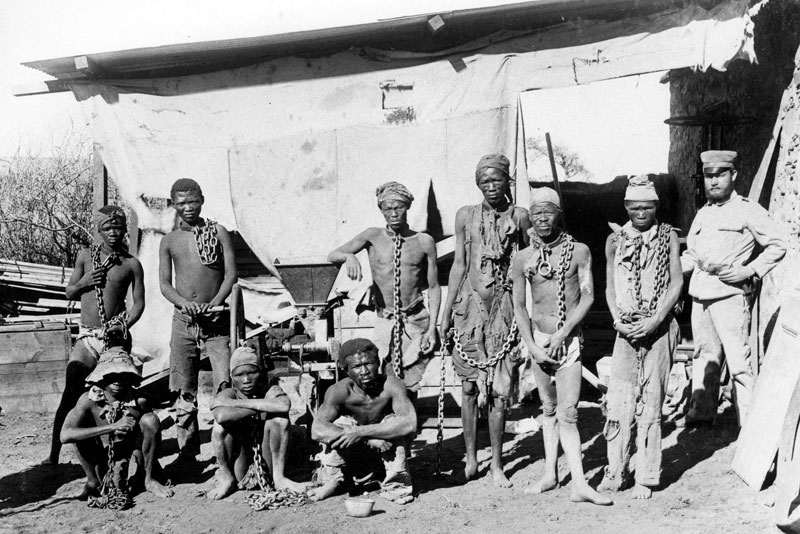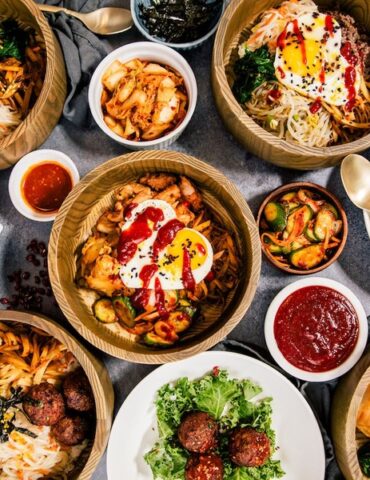Contact Us

Office: 083 000 1000
Studio: 083 00 00 967
Telegram: 083 00 00 967
WhatsApp: 083 00 00 967
Telegram: 083 00 00 967
WhatsApp: 083 00 00 967
Location: Unit 42 & 44, Hyper Motor City, Maxwell Street, Windhoek, Namibia
Listeners:
Top listeners:
Radiowave 96.7FM
 play_arrow
play_arrowUltimate Braai Competition with Round Table Windhoek 34 Lunch w/ Yanika




Ovaherero in chains. During the colonial period in German South West Africa, now Namibia, the Germans brutally suppressed the indigenous population. (Image source: www.spiegel.de)
By: Vitalio Angula
Clinical Psychologist Edwina Mensah-Husselmann says supporting young people in processing inherited trauma is not about shielding them from painful truths, but about affording them the tools, language, and support to hold that truth with strength, pride and purpose.
Speaking at the Trilogy to the Future dialogue which is a build-up to the inaugural Genocide Remembrance Day to be held on the 28 May, Husselmann said that “when young people are equipped with historical understanding and emotional resilience, they become the bridge between survival and thriving, a generation that remembers not to remain wounded but to lead with restored dignity and renewed vision”.
The 1904-1908 Ovaherero/Nama (Khoekhoe ethnic group) Genocide did not only leave its victims dispossessed of land and cattle, but the violence visited upon the Ovaherero and Nama by the then German Colonial Authorities left deep rooted scars of trauma which have been passed on from generation to generation.
This unresolved trauma manifests itself in negative behaviour such as substance abuse and emotional numbing, educational underperformance, lateral violence including community conflict, and increased crime due to unresolved grief according to Mensah-Husselmann.
In acknowledging the on-going effects of the genocide, the emerging science of epigenetics emerges in contemporary discourse.
Epigenetics is the study of how behaviour and environment cause changes affecting gene expression.
“On a bio-neurological level, trauma goes and sits in our cells and that’s where we get inflammatory diseases like arthritis and colon disease… it is as a result of an over-active nervous system being in distress and what we call muscle memory.”
That trauma response is sitting in our cells being passed on. Just like the phrase goes “It runs in the blood” we can inherit things like anxiety, Mensah-Husselmann explained to a question posed on the link between past trauma and current trauma being experienced by descendants of the 1904-1908 genocide.
In her essay titled Understanding Epigenetics as a Descendant of Holocaust Survivors, Elle Rosenfeld of the Jewish Women’s Archive explains how epigenetic changes can be transmitted across generations through intergenerational mechanisms.
“Research indicates that the offspring of Holocaust survivors are more likely to exhibit altered chemical patterns, even without direct exposure to trauma. These epigenetic changes occur because the body anticipates that the offspring will experience a similar environment to that of their parents,” Rosenfeld writes.
She further notes, “Theoretically, intergenerational trauma arises when a stressor affects a parent’s germ cells, embedding certain traits that are then passed down through generations.”
Stress, anxiety, poverty, land insecurity as a result of colonial dispossession have been identified as primary drivers of negative behaviour such as substance abuse amongst descendants of Namibia’s 1904-1908 Ovaherero/Nama Genocide.
The collective history of genocide is embedded in Ovaherero and Nama identity; and in acknowledging the genocide’s ongoing effects on these communities, human rights activist, Joyce Muzengwa says, negative stereotypes attributed to these communities as being more susceptible to alcohol use disorders when compared to other communities is not only harmful but serves as a reminder of the trans-generational impact of genocide, where some members of these communities have turned to alcohol as a mal-adaptive coping mechanism not only in dealing with their current challenges but also in dealing with the unresolved trauma of the past.

Deputy Chairperson Ovaherero Genocide Foundation Mbiripipo Vivian “Joyce” Muzengua
“If collective healing does not take place, there is a chance that the generation after us will still carry the wounds of the past or the gene memory of the past”, Muzengwa said at a recently held panel discussion.
When asked whether alcohol use disorder amongst affected communities can be regarded as a symptom of unresolved trauma and a coping mechanism rather than a negative stereotype Muzengwa said the three are not mutually exclusive and exist side by side in understanding how communities deal with unresolved trauma as a collective.
“Alcohol use is embedded in our culture but for some it can progress to a point where it becomes a disorder (addiction), given that in some instances land was traded for a bottle of whisky the relationship with alcohol amongst indigenous people becomes a subject worth interrogating in itself.”
In less than three weeks, Namibia will observe its first Genocide Remembrance Day at a yet-to-be-announced venue. However, some descendants of those who endured this dark chapter in the country’s history have already signalled their lack of interest in participating in the day’s activities.
A well-known member of the Nama Community says they will not be attending the event because of the apparent misrepresentation of history regarding historical facts like the date when the concentration camps were officially closed by the colonial rulers.

“We are preparing to host the annual Nama Cultural Festival at Keetmanshoop so we will not be available for the activities being undertaken by the state, lies politically have a way of making themselves truths through repetition. You tell it so many times by engraving into the collective memory through your national calender”, she said, admonishing the Genocide Remembrance Day adopted by parliament.
At its second installment of the Trilogy to the Future Dialogue, panellists Suzie Shefeni and Elmaria Kapunda presented Stories of Women During Colonial Namibia.
These stories seek to inform Namibians of the struggles they encountered and how these struggles have shaped contemporary Namibia and how the future of Namibia can be shaped by addressing the social-economic challenges Namibians face as a result of their history.
Vitalio Angula is a socio-political commentator and independent columnist.
The post Trans-generational trauma among descendants of Namibia’s 1904–1908 Genocide first appeared on Future Media News.
The post Trans-generational trauma among descendants of Namibia’s 1904–1908 Genocide appeared first on Future Media News.
Written by: Madeline


9:00 pm - 12:00 am

COPYRIGHT 2025 Radiowave 96.7FM | WEBSITE BY DIGITAL PLATFORMS